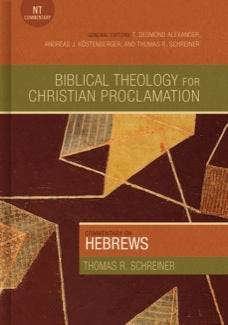Description
The Biblical Theology for Christian Proclamation Commentary series explores the theology of the Bible in considerable depth, spanning both Testaments. Authors come from a variety of backgrounds and perspectives, though all affirm the inerrancy and inspiration of Scripture. United in their high view of Scripture, and in their belief in the underlying unity of Scripture, which is ultimately grounded in the unity of God himself, each author explores the contribution of a given book or group of books to the theology of Scripture as a whole. While conceived as stand-alone volumes, each volume thus also makes a contribution to the larger whole. All volumes provide a discussion of introductory matters, including the historical setting and the literary structure of a given book of Scripture. Also included is an exegetical treatment of all the relevant passages in succinct commentary-style format. The biblical theology approach of the series will also inform and play a role in the commentary proper. The commentator permits a discussion between the commentary proper and the biblical theology that it reflects by a series of cross-references. The major contribution of each volume, however, is a thorough discussion of the most important themes of the biblical book in relation to the canon as a whole. This format allows each contributor to ground Biblical Theology, as is proper, in an appropriate appraisal of the relevant historical and literary features of a particular book in Scripture while at the same time focusing on its major theological contribution to the entire Christian canon in the context of the larger salvation-historical metanarrative of Scripture. Within this overall format, there will be room for each individual contributor to explore the major themes of his or her particular corpus in the way he or she sees most appropriate for the material under consideration. This format, in itself, would already be a valuable contribution to Biblical Theology. But there are other series that try to accomplish a survey of the Bible's theology as well. What distinguishes the present series is its orientation toward Christian proclamation. This is the Biblical Theology for Christian Proclamation commentary series! As a result, the ultimate purpose of this set of volumes is not exclusively, or even primarily, academic. Rather, we seek to relate Biblical Theology to our own lives and to the life of the church. Our desire is to equip those in Christian ministry who are called by God to preach and teach the precious truths of Scripture to their congregations, both in North America and in a global context. It is our hope and our prayer that the 40 volumes of this series, once completed, will bear witness to the unity in diversity of the canon of Scripture as they probe the individual contributions of each of its 66 books. The authors and editors are united in their desire that in so doing the series will magnify the name of Christ and bring glory to the triune God who revealed himself in Scripture so that everyone who calls on the name of the Lord will be saved—to the glory of God the Father and his Son, the Lord Jesus Christ, under the illumination of the Holy Spirit, and for the good of his church. To God alone be the glory: soli Deo gloria . In his volume on Hebrews , Thomas R. Schreiner says, 'The words of Jesus on the cross, 'it is finished' (John 19:30) capture the theology of Hebrews. 'My aim in this commentary is to focus on the biblical theology of the letter. The emphasis on biblical theology shows up especially in the introduction and conclusion where theological structures and themes are considered. In the introduction I will examine four different structures that are woven into the entire letter: 1) promise/fulfillment; 2) eschatology; 3) typology; and 4) spatial orientation (which can also be described as the relationship between heaven and earth i






